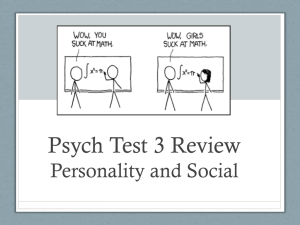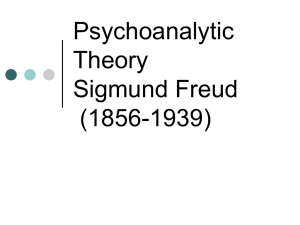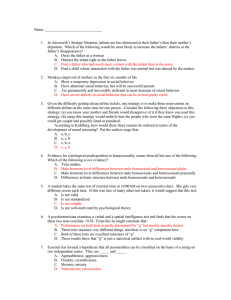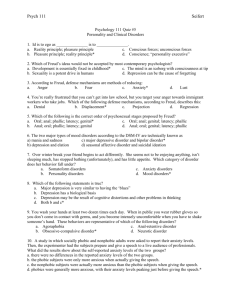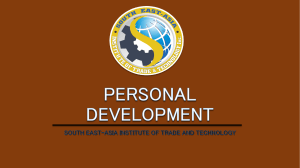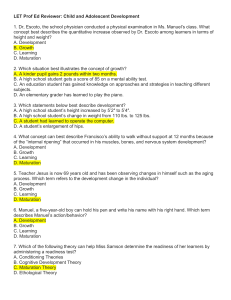Growth from Birth to Age 5 PSY 121 Chapters 5 - 10
advertisement
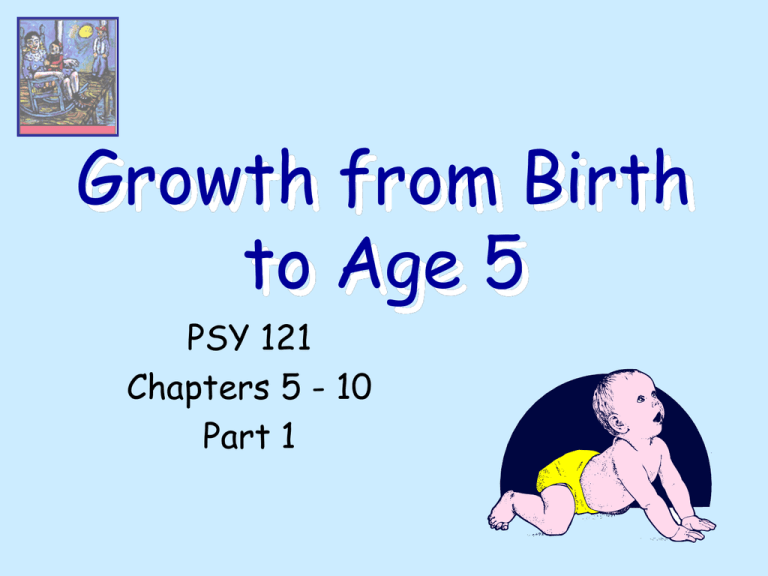
Growth from Birth to Age 5 PSY 121 Chapters 5 - 10 Part 1 Sensation versus Perception • Receiving environmental stimuli versus • Giving meaning to information received by the sensory system Neuron • Parts of a neuron • dendrite • cell body • axon • synapse • myelin A NEURON The Brain • Left brain processes verbal, numerical, textual & logical information • Right brain processes spatial, colored & creative information • Hemispheres have differing functions but don’t work independently. • • Both generally work together to perform most tasks. One side may be faster. Left Hemisphere Rt Hemisphere Language Process positive emotions Spatial relationships; artistic abilities Perception & expression of emotion; negative emotions The Brain • Right and left halves are joined by the corpus • Myelination callosum. Myelin Sheath • • Insulation on axon to improve speed of transmission. Also insulates axon from activity of other neurons. Reflexes •Survival reflexes •Breathing •Sucking •Rooting •Swallowing Other Reflexes •Startle or Moro •Babinski •Walking (stepping) •Swimming Motor Skills •Gross Motor Skills large body movements such as running, climbing, jumping and throwing •Earliest and easiest to be mastered •Fine Motor Skills are smaller body movements such as drawing, buttoning, coloring, tying shoes, using tools, etc.. • require some maturation nervous system of to develop Types of Play* •Sensorimotor Play • Parallel Play • Rough and Tumble Play • Play Face • Mastery Play • Dramatic Play * not a complete list; categories are not mutually exclusive Sigmund Freud •First clearly delineated “stage theory” • Human development proceeds in orderly stages; one stage must be reached before the next stage can happen • Controversial • Failure to attain success is called fixation. Psychosexual Stages • Oral • Anal • Phallic • Latency • Genital Oral Stage • Focus on the the mouth • feeding, sucking, babbling, blowing bubbles, etc. • from birth to 1 year • fixation = oral-aggressive or oralreceptive Anal Stage • Focus on the anal sphincter muscles • Toilet-training:freedom and control issues: own body, parents • fixation = anal-retentive and anal-expulsive Phallic Stage • Centered on the genitals, especially the penis. • Awareness of sex and gender differences • Identification with and role-play of same sex parent Phallic Stage • Fixation = Oedipus complex in boys and Electra complex in girls • castration anxiety for males • penis envy in females Latency and Genital Stage • Most challenging development happens on oral, anal and phallic stages • latency - repressed sexuality due to unconscious guilt • Genital stage - adolescence renewed interest in genital stimulation; adult sexuality Erikson’s Psychosocial Stages • Infancy = Basic trust versus mistrust • Toddlerhood = autonomy versus shame and doubt • Preschool = initiative versus guilt Social Learning Theory • Modeling: Learning by observation and imitation • learned aggressiveness and learned helplessness • Importance of television and other media on learning
